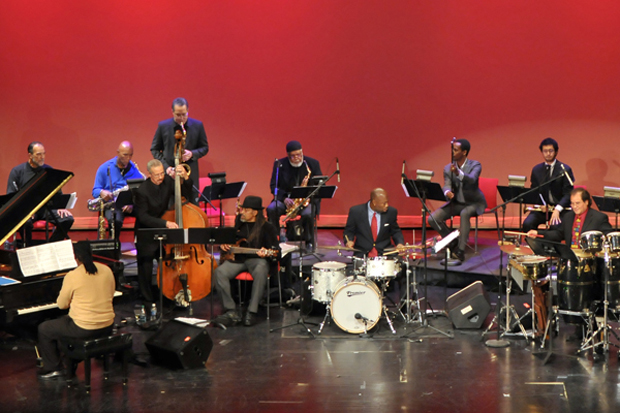The transformative power of music

Leonard Brown, an associate professor of music and African American Studies at Northeastern University, believes in the transformative power of music, which, he says, “can be a force to make the world a better place.”
He has a particular love for jazz, a musical style born out of a mix of African and European traditions, co-founding the John Coltrane Memorial Concert in 1977 to honor the musical and spiritual legacy of the pioneering jazz saxophonist.
Northeastern University will host the 35th annual Coltrane concert in Blackman Auditorium on Saturday at 7:30 p.m. Tickets can be purchased online or by calling 617-373-4700.
The world’s oldest annual performance tribute to the jazz legend will feature an 11-piece ensemble cast. Performers will include pianist Emmett Price, a co-producer of the concert and associate professor of music at Northeastern, and drummer Terri Lyne Carrington, a 2012 Grammy-Award winner, composer and record producer.
Brown, who will play the tenor and soprano saxophone, noted that the talented musicians will bring a unique interpretation to Coltrane classics such as “Equinox,” “After the Rain” and “Central Park West.”
“People keep coming back to the show because of the integrity and sincerity we bring to our interpretation of Coltrane,” he says. “We try to breathe life into his songs while staying true to his form.”
Approximately 80 students from three local schools that participate in the John Coltrane Memorial Concert Outreach Program will attend the performance. Since its inception in 1994, the outreach program has used music as the context to initiative a unique exchange among generations of teachers, musicians and more than 10,000 students.
The outreach program’s ultimate goal is to expose students to qualities such as perseverance, focus, positive self-image and the willingness to learn. With younger students, the goal is more straightforward: to bring music into their lives.
“Most kids don’t hear music like this,” Brown says. “The listening experience can help them develop their intelligence and capacity for making the world a better place.”





